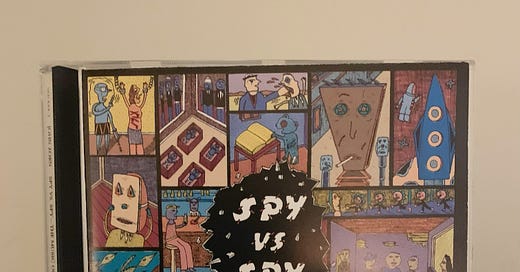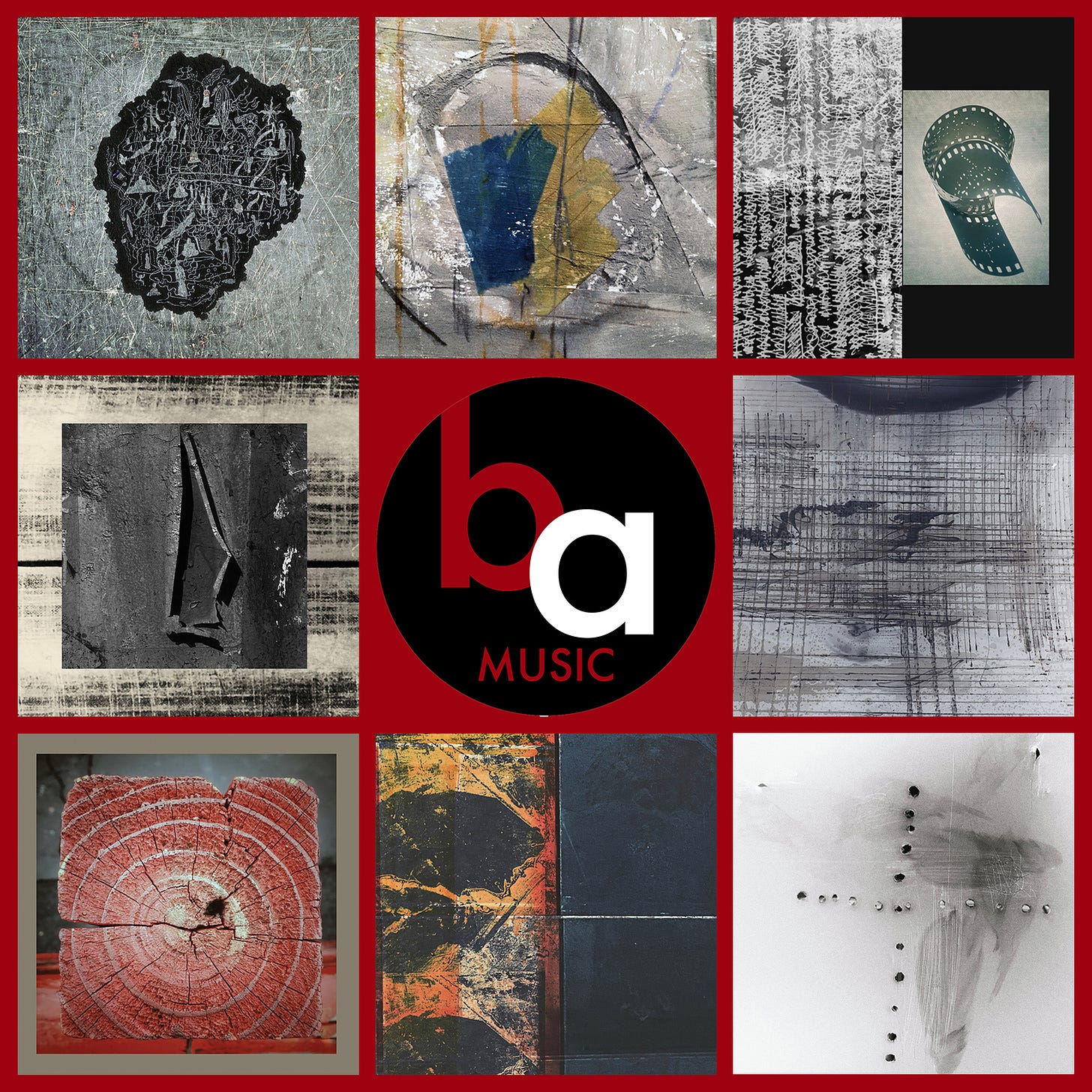The Mystery Of Spy Vs. Spy
The brilliant John Zorn album that's out of print and not streaming
Lemme say three things real quick:
1) My book is out! In the Brewing Luminous: The Life & Music of Cecil Taylor is now available from Amazon and direct from the publisher. (I had a few copies myself; thanks to all of you who bought them. They should be in your mailboxes this week.)
2) Buy a José Lencastre CD! Lencastre is a Portuguese saxophonist; his album Inner Voices features him on overdubbed alto and tenor saxes, and Ary on electronics. It sounds like nothing you’ve ever heard, but may remind you of Julius Hemphill and/or Autechre. Get it on Bandcamp.
3) Montana update! It’s hot. It’s been in the mid-90s for the last week, and will probably stay that way for another week or so. But there haven’t been any wildfires, so the air is clean and the skies are gorgeous, absolutely head-spinningly blue. And there’s no humidity at all. Back in New Jersey, I’d have been sweating through my shirt just walking from my front door to the car. Not here; I can sit outside and read in comfort (Tony Judt’s Postwar, and Enrique Krauze’s Mexico: Biography of Power, if you’re curious).
John Zorn has been operating with total independence for over 30 years. In 1992, he started Avant Records, with distribution via the Japanese label DIW. Three years later, he launched Tzadik, which continues to this day. But for a brief period before that, he was a major label artist. Between 1986 and 1990, Zorn released four albums on Nonesuch: The Big Gundown: John Zorn Plays the Music of Ennio Morricone; Spillane; Spy vs. Spy — The Music of Ornette Coleman; and Naked City, the debut of his band of the same name.
All four of those albums are great. The Big Gundown was reissued on Tzadik, with bonus tracks, in 2000. The tracks from Naked City were included in the 2005 5CD Complete Studio Recordings box, also on Tzadik and also including a newly recorded bonus track — “Grand Guignol (Vocal Version)”, featuring Mike Patton. But Spillane and Spy vs. Spy are both out of print, and I don’t really understand why. (I emailed Nonesuch to find out, and was told, “those are John’s preferences.”)
Spy vs. Spy was released sometime in 1989 — I’m not sure of the exact date — on LP, cassette, and CD, making it 35 this year. When it came out, I had already heard Spillane and The Big Gundown via a slightly older kid who lived across the street who also turned me on to Frank Zappa and the Residents, playing me Hot Rats and The 13th Anniversary Show, and listened enthusiastically to Miles Davis’s On the Corner, which I brought over as my own contribution to our dialogue. But I didn’t actually hear Spy vs. Spy until after I’d heard Zorn’s next thing: the self-titled debut album by Naked City, which got a bigger push from Elektra (Nonesuch’s parent company at the time). There was a poster in my small suburban town’s record store. There was even a music video for the opening track, “Batman” (mistitled “Gotham” in the clip below).
When I finally did hear Spy vs. Spy, I was blown away by it. The album consists of 17 Ornette Coleman compositions arranged by Zorn and performed by himself, fellow alto saxophonist Tim Berne (Berne is in the left speaker, Zorn in the right), bassist Mark Dresser, and drummers Joey Baron and Michael Vatcher.
The liner notes pay tribute to Zorn’s deep interest in hardcore, thrash, and grindcore, offering shout-outs to drummers Mick Harris, Ted Epstein and Pill (of Napalm Death, Blind Idiot God, and Lip Cream, respectively) alongside Ornette and Denardo Coleman and thrash bands DRI and The Accüsed. And that’s very much reflected in the music, which is played fast and hard, and mixed for maximum intensity. The drums are treated with cavernous reverb, and Dresser’s bass is often buried under the avalanche, while the two horns are squalling and shrieking. Zorn and Berne play the heads in tight unison, but then begin soloing simultaneously, as though they’ve suddenly lost the ability to hear each other. Of the 17 tracks, only four are more than three minutes long, while six are under 90 seconds each.
It’s very much sequenced like an LP, with two distinct halves. Side A of the vinyl or cassette version contains 11 tracks, including all of the under-two-minute blasts. “Chronology”, “Peace Warriors” and “Blues Connotation” are particularly manic, played with a ferocity and precision worthy of the Bad Brains (who were a shredtastic fusion group before discovering punk rock, remember). Meanwhile, Side B finds the band stretching out and playing more lyrically. “Feet Music” and “Mob Job” are each nearly five minutes long, the former a hard funk jam and the latter fierce but swinging. On “Broadway Blues”, Dresser plays with a bow as Berne and Zorn keen and the drums merely rumble rather than blasting.
One of the things I love most about the album is that it deals with Ornette Coleman not as someone from the past in need of rediscovery, but as a living composer. The choice of repertoire makes this abundantly clear. The earliest pieces, “Chippie” and “The Disguise”, come from his 1958 debut, Something Else!!!!, but Spy vs. Spy also includes versions of four tracks — “Peace Warriors”, “Feet Music”, “Word for Bird”, and “Space Church” — from In All Languages, which had come out just the previous year. Zorn and company also interpret compositions from Ornette on Tenor, The Empty Foxhole, Of Human Feelings, and more. The whole thing is clearly a labor of love from someone steeped in Coleman’s music.
This is not a record aimed at traditional jazz listeners, and it’s not hard to find old-school, finger-popping critics who hate it. (If they’d been around at the time, they’d probably have hated Ornette on first hearing, too.) One of the funniest reviews comes from All Music Guide’s Scott Yanow, a man who puts the “dud” in “fuddy-duddy”; he says, “the interpretations are unremittingly violent” and claims, “The lack of variety in either mood or routine quickly wears one out. After about ten minutes, boredom sets in, although, when taken in short doses, the performances have the potential of shocking (or at least annoying) most listeners.” On the other hand, writing for Trouser Press, Douglas Wolk called it “a wonderful, invigorating record” that “steamrollers over the subtleties of Coleman’s writing (though Zorn and Berne are amazingly deft at these high speeds) and doesn’t exactly shed any new light on the tunes, but the energy of the recording is beyond belief.”
Spy vs. Spy isn’t for everyone, but it’s one of my favorite John Zorn records. It’s exactly the kind of thing that could draw a newcomer into his world — it’s got an obvious conceptual hook, the music itself is a jolt of pure adrenaline, and once it’s gotten its hooks in you with the screaming hardcore blasts, it blossoms like a lotus and becomes extraordinarily beautiful in its second half. And yet, it’s one of the most difficult Zorn albums to actually hear. It’s not on streaming services, and it’s out of print on CD. Yes, you can pick up a used CD copy pretty easily on Discogs or eBay, but it really deserves to be as widely available as possible.
In this section of a late ’80s documentary, Zorn talks about the Spy vs. Spy project, and there’s footage of the group rehearsing and then performing:
And here’s the entire album on YouTube:
That’s it for now. See you next week!






My first date with my future wife was Indian food on 6th Street, then watching Zorn + Berne play the Spy Vs Spy Ornette stuff from the sidewalk beneath the open windows of the old Knitting Factory on Houston Street on a warm summer night. It was glorious. (She dug it, too; we're still together.) I saw Naked City there sometime later, who were astonishing, but imho nowhere near as pleasurable.
Hell yes! My copy of Spy Vs. Spy is on the shelf, between Naked City and Film Works, 1986-1990, another classic Nonesuch release. Spillane and The Big Gundown reside among the LPs, where I also have Torture Garden by Naked City. It's favorite Zorn period by a long shot.